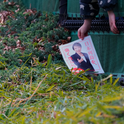For almost a fortnight in early September, Xi Jinping disappeared. The next leader of China, due to be anointed at the Communist party’s 18th Congress (which starts on 8th November), could not be seen in public or in the official Chinese media. It was as if he had been airbrushed from the podium above the Tiananmen gate before he’d even stepped onto it.
All mainland Chinese news sources were silent, so rumours spread. It was a perfect example of what happens when the party doesn’t answer questions: the public made up the news and circulated it online. Xi had been assassinated; he had survived an assassination attempt (a staged car accident); he’d had a heart attack/a stroke; he had injured his back playing soccer or tennis.
Until now, only a handful of people knew the true story. It derives from someone with access to the top level of the Chinese governing apparatus. I have no reason to doubt it, apart from it being too plausible to be true.
In the first days of September, Xi chaired a meeting of the “red second generation,” the sons and daughters of the party’s old guard. The second generation are in late middle age and exert disproportionate influence through their families’ political and commercial networks. It is considered prudent for the incoming leader to submit to them his plans for a tenure that will last, if all goes well, for the next ten years.
The second generation is split along factional and family lines. They hold grudges that go back decades. The recent Bo Xilai scandal is a good example of those hidden rivalries coming out into the open. When the second generation meet there is conflict, sometimes physical. Fifty years ago the battles between their parents might have ended with the loser being sent to a forced labour camp, or worse.
The meeting turned violent. They went at it hammer and sickle. Xi Jinping tried to calm them down. He put himself physically in the crossfire and unwittingly into the path of a chair as it was thrown across the room. It hit him in the back, injuring him. Hence the absence, and the silence, and the rumours.
The party missed an opportunity. It could have shown that its new leader has the courage to quell the squabbling about personal histories and vested interests that doubtless prompted the fight. Now that would have been good propaganda.
Get a free copy of Prospect (UK only)
Follow Prospect on Facebook and Twitter
You'll never be Chinese: After 16 years I'm leaving the country I loved, says Mark Kitto
Copycat China: Is China's “copycat” phenomenon an excuse for pirating or an inspiring challenge to authority? asks author Yu Hua
China’s new intelligentsia: Despite the global interest in the rise of China, no one is paying much attention to its ideas and who produces them. Yet China has a surprisingly lively intellectual class whose ideas may prove a serious challenge to western liberal hegemony, says Mark Leonard
The key to China: To grasp the new spirit of this country, Julia Lovell recommends this fresh, contrarian short fiction













